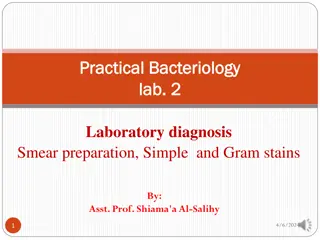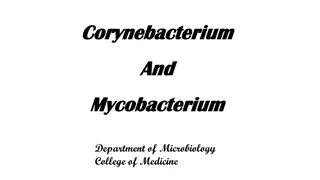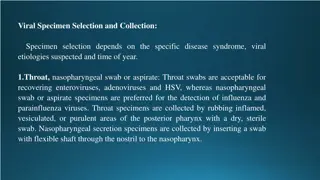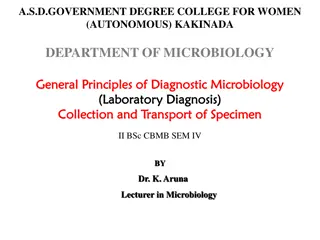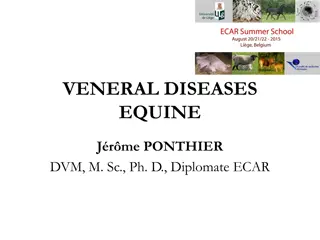Practical Bacteriology Laboratory Diagnosis and Sample Collection
This practical guide focuses on laboratory diagnosis steps in bacteriology, covering specimen collection, microscopic examination, culture tests, biochemical tests, serological tests, and molecular tests. Learn about various sample collection methods for urine, stool, swabs, sputum, pus, CSF, and mo
3 views • 23 slides
Updated Vancomycin Collaborative Practice Guidelines in 2020
Vancomycin guidelines updated in 2020 include transitioning from trough-based to AUC-based monitoring, emphasizing achieving an AUC/MIC of 400-600 for improved outcomes. Major updates involve loading dose adjustments, targeting AUC/MIC instead of trough levels, and pharmacist-orderable MRSA nasal sw
0 views • 38 slides
Overview of Corynebacterium: Characteristics, Infections, and Laboratory Diagnostics
Corynebacterium is a genus of Gram-positive rod-shaped bacteria widely distributed in nature. They are catalase positive, non-spore-forming, non-motile bacteria with unique morphological features. The most notable human infection caused by Corynebacterium is diphtheria, characterized by the formatio
0 views • 25 slides
Blood Evidence Collection and Preservation Guidelines
Learn about the proper collection and preservation methods for liquid blood, dried stains, stained clothing, swabs of stains, and envelopes in forensic investigations. Follow detailed instructions for identification, preservation, wrapping, and packing to ensure the integrity of blood evidence.
0 views • 11 slides
Otitis Externa: Overview, Risk Factors, and Treatment
Otitis externa, also known as swimmer's ear, is an inflammation of the external auditory canal. It can be acute or chronic and is common among individuals aged 7-14 years. The main causative organisms include Pseudomonas aeruginosa and Staphylococcus aureus. Risk factors include swimming in pools, h
0 views • 10 slides
Viral Specimen Selection and Collection Overview
Specimen selection for viral testing depends on the suspected viral etiologies and disease syndrome. Throat and nasopharyngeal swabs are used for different viruses, while rectal swabs, urine, blood, and tissue samples are also collected for specific viral detection. Proper specimen transport and sto
0 views • 7 slides
Collection and Transport of Specimens in Diagnostic Microbiology
Successful laboratory investigations depend on the proper collection and transport of specimens. This involves selecting adequate samples that represent the diseased area, avoiding contamination, obtaining specimens before administering antimicrobials, ensuring biosafety, proper documentation, and t
0 views • 20 slides
Equine Venereal Diseases: Diagnosis and Treatment Overview by Jrme PONTHIER DVM
Learn about the diagnosis and treatment of equine venereal diseases such as Taylorella equigenitalis in horses. Understand the pathogenesis, transmission, and legal obligations for these diseases in the UE (European Union). Discover the general approaches for diagnosis and treatment in stallions and
0 views • 17 slides
